Table of Contents
As a gas engineer, your skills ensure homes and businesses stay safe, warm, and functional. But even the best engineers won’t get far without being found online in 2025. That’s where SEO for Gas Engineers comes in.
Back in 2024, the demand for certified gas engineers grew exponentially and this tendency is only expected to go up in 2025. However, being found organically online for search terms like “boiler repair near me” or “certified gas engineer in [city]” could be tricky.
In this comprehensive guide, I’ll take you step by step through optimising your website and online presence for maximum visibility. Whether you’re new to SEO or have dabbled before, this guide is packed with actionable tips tailored for gas engineers.
What Is SEO For Gas Engineers?
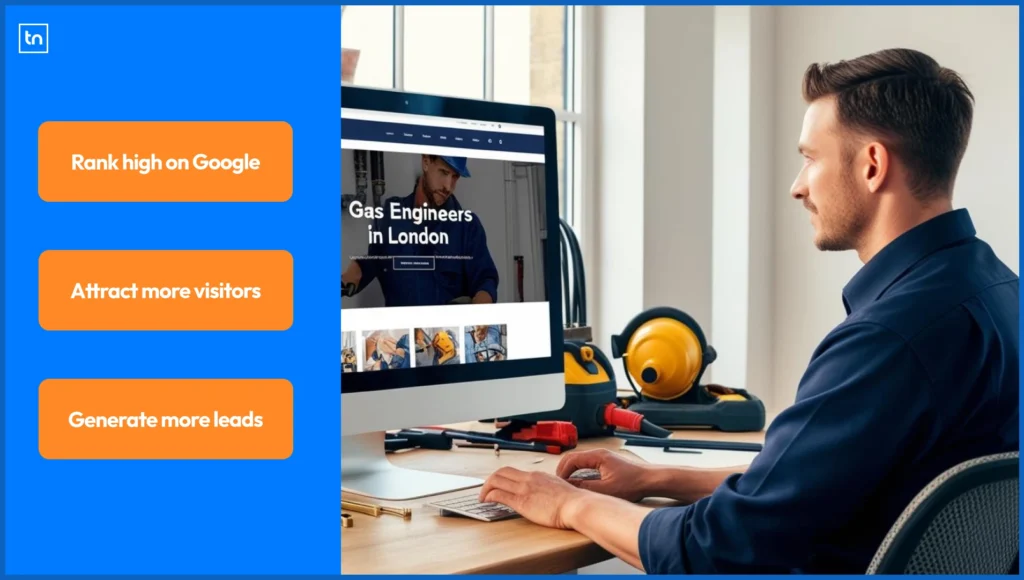
Search Engine Optimisation for gas engineers is the process of improving your website and online presence so that search engines like Google rank you higher in search results. The higher your ranking, the more likely potential customers are to find and book your service.
For example, if a homeowner searches for “emergency gas engineer in Manchester,” SEO ensures that your website appears at the top of the search results. It’s all about making it easy for people to find you when they need you most.
Why Do Gas Engineers Need SEO?
Think about how you search for services yourself. Whether you search for an electrician, roofer, or car mechanic, you likely turn to Google. Your potential customers are doing the same when they need a gas safety certificate, a boiler repair, or a new heating system installed.
Without SEO, you’re invisible online. Effective SEO not only increases leads but also builds trust – people tend to trust businesses that appear prominently in search results. In addition to that, SEO campaigns often include writing helpful articles which boost your authority and people start seeing you as the go-to expert over time.
Your website is a “golden goose”, it’s not just a digital business card like most tradespeople think. To make the most of it, you’ll need to optimise it for on-page SEO, technical SEO, local SEO and more. Let’s get into the details.
On-Page SEO Essentials For Gas Engineers
On-page SEO refers to the elements you control directly on your website. From keyword research to creating and optimising your web pages. Here’s how to get it right:
Keyword Research For Gas Engineers
Start by identifying the terms your customers are searching for. Tools like Google Keyword Planner or Semrush can help. Keep in mind that you need to use your chosen keyword phrases naturally in your content and avoid using them too often. This will harm your ranking and user experience.
- “Emergency Gas Engineer”
- “Boiler repair [city]”
- “Gas safety certificate near me”
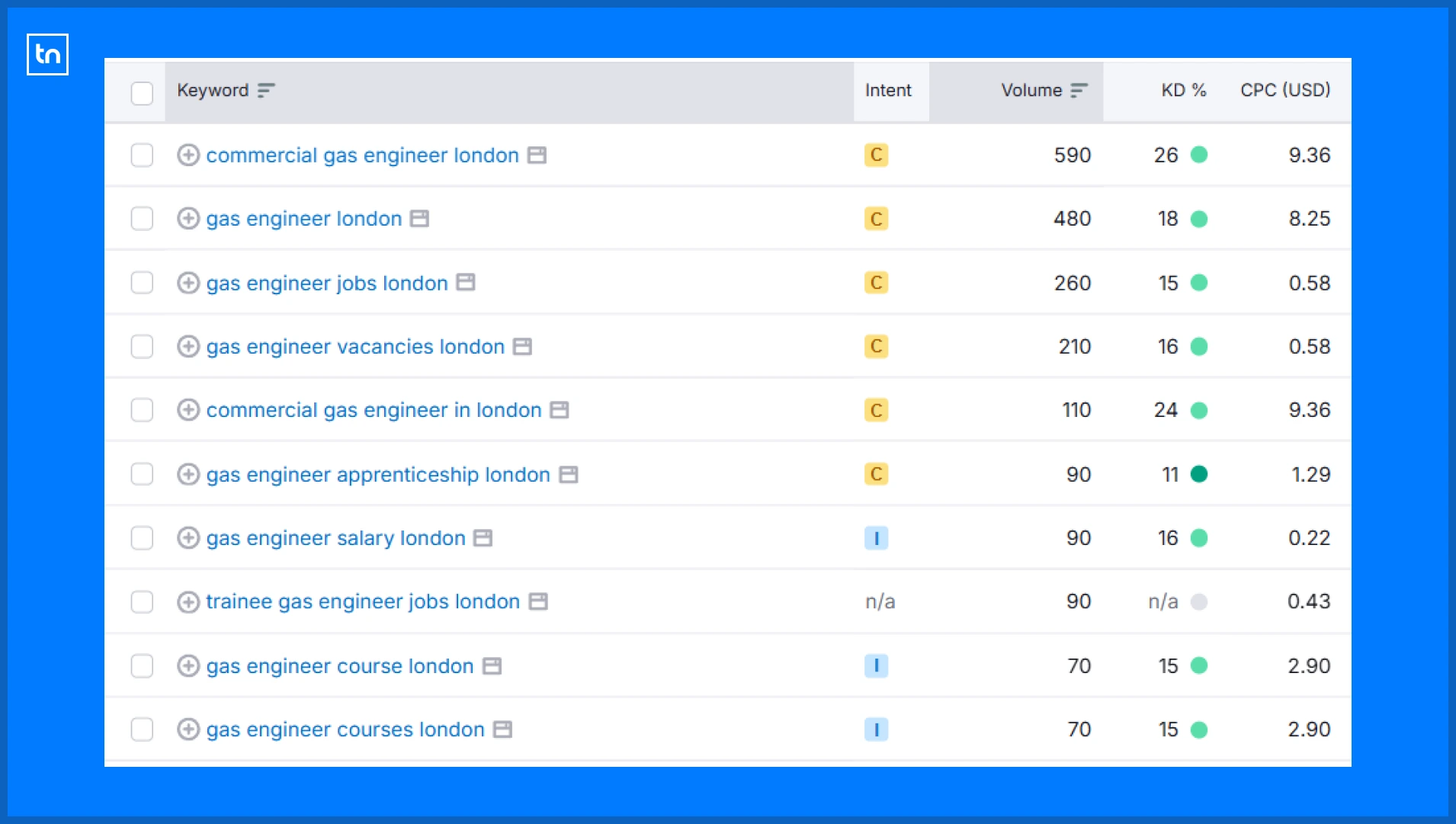
My recommendation is:
- Choose keywords that are either Informational, Commercial or Transactional
- Avoid Navigational search terms.
- Look for less competitive keywords that have keyword difficulty of 1-20 and have above 40 monthly searches.
- Don’t focus on keywords like “gas engineers” but rather choose broader long-tail keywords like “certified gas engineers near me”. The term “gas engineers” will be overly saturated and it’s not likely to be able to rank for it, also the word itself is not transactional, whereas “certified gas engineers near me” is a transactional keyword, meaning that people who are searching it, are ready to buy.
Create Service-Specific Pages
Create dedicated pages for each service you offer. For example:
- “Boiler Repairs”
- “Central Heating Installations”
- “Emergency Gas Engineer Services”
This structure makes it clear to Google (and customers) what you do and improves your chances of ranking for those specific terms.
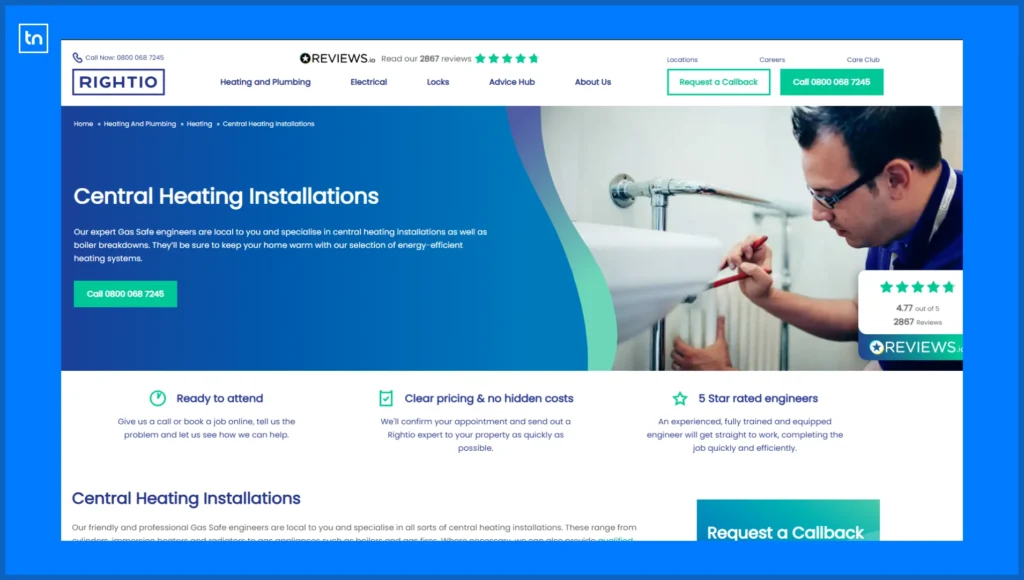
Create Location-Specific Pages
Create service pages targeting specific areas that you serve. For example, this could be:
- “Emergency Gas Engineers London”
- “Certified Gas Engineers Barking”
- “Boiler Repairs Manchester”
This technique helps you rank for long-tail keywords and boosts your chances of ranking higher for local searches. It works effectively with your Google Business Profile. For example, you can list all service areas in your GBP profile and create location pages for all services.
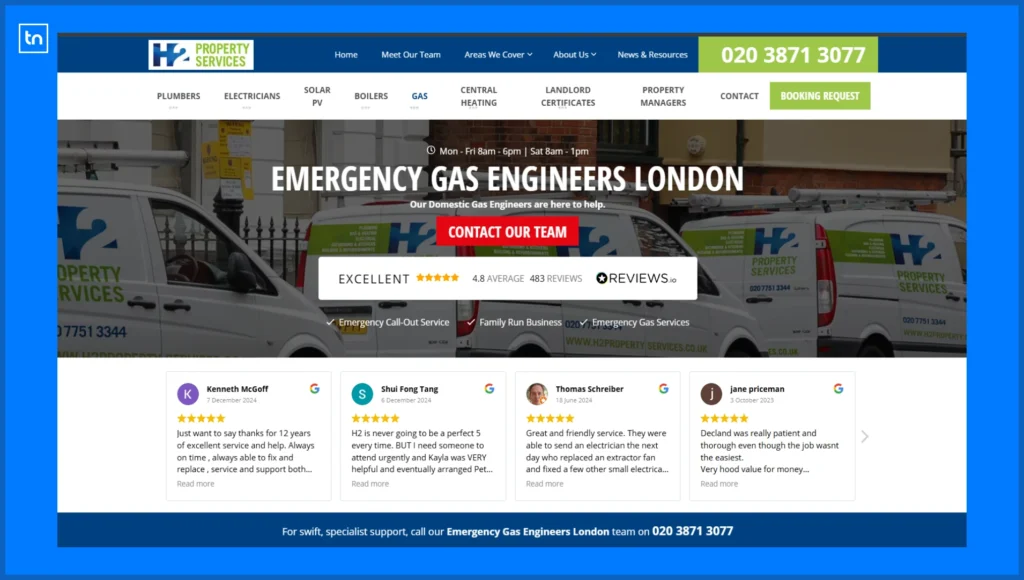
Write Content That Answers People’s Questions
Add content that helps your audience solve problems by themselves or check things that should otherwise involve an expert. People call it a blog, but you can create longer, comprehensive articles, DIY guides, case studies and more. For example, you can create the following articles:
- “10 Signs Your Boiler Needs Servicing”
- “How to Check if Your Gas Appliance Is Safe”
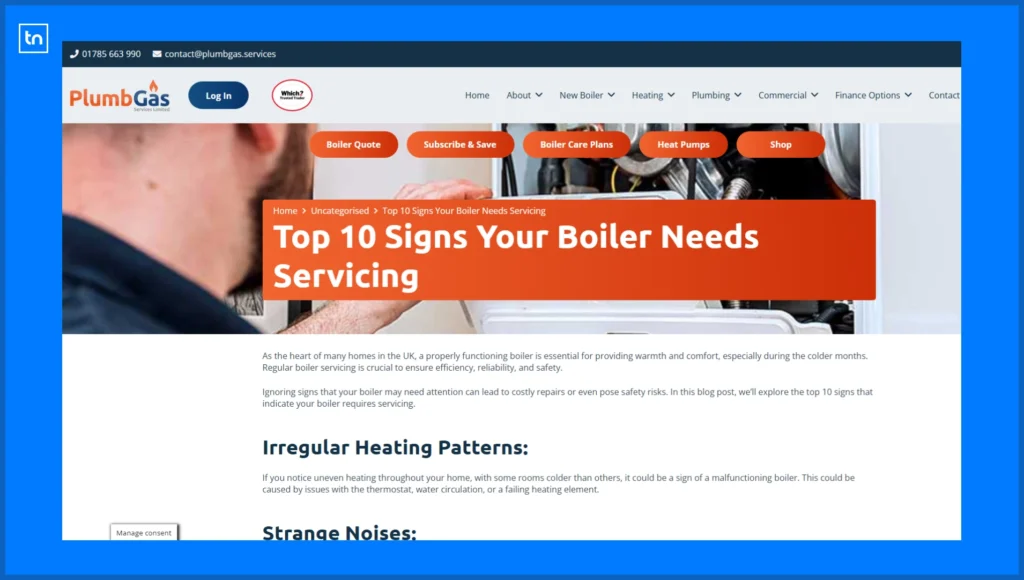
This is not only important to increase your credibility in front of potential customers but also helps you boost your topical authority on Google, leading to an overall better ranking of your website. By being consistent with your content creation efforts, you will significantly improve the user experience for your future customers and establish an authority hub through expertise.
Top 5 Technical SEO Tips
Behind-the-scenes optimisation is just as important as the visible elements. Here are some key tips:
- Website Speed: A slow website can hurt your rankings. Use tools like GTmetrix or PageSpeed Insights to check your site’s speed and address issues like large images or outdated plugins.
Here I try to keep it short, but speed optimisation involves more than optimising images and removing outdated plugins. My advice is, if you use WordPress, to install the LiteSpeed Cache plugin and use the recommended settings. It will also help you with image optimisation and conversion to WebP files which are web-friendly. - Mobile-Friendly Design: Over 93% of users search on their phones and yes, a client first checks up on your website before deciding whether to call or not. A mobile-friendly website is crucial. Ensure your website looks great and works perfectly on mobile devices.
- Fully Responsive Design: More and more people are using tablets and mobiles these days, hence a website has to work on all screen sizes. I recommend optimising for mobile, tablet, small screen (laptop) and large screen (desktop).
- Secure Your Website (SSL): Customers trust secure sites (those with HTTPS). Most hosting providers offer free SSL certificates – make sure yours is active.
- Find and fix 404 pages: 404 error pages appear when a page no longer exists. They harm user experience and negatively affect your SEO. This usually happens if a page is deleted but its link still exists somewhere on your site, or if you change a page’s URL (slug) but don’t update the links pointing to it.
These 5 tips are some of the most important ranking and user experience factors. Here you can learn more about Technical SEO and why is it important.
Local SEO For Gas Engineers
As a gas engineer, most of your customers are local. Here’s how to dominate your local market:
- Google My Business (GMB): Claim and optimise your GMB profile. Add your business name, address, phone number (NAP), operating hours, and photos of your work. Regularly post updates and respond to reviews.
- NAP Consistency: Your Name, Address, and Phone number should be consistent everywhere – on your website, directories, and social media.
- List Your Business On Local Directories: Local directories are mostly free to register and give you both exposure to potential customers and local SEO boost. When search engines find your business listed on relevant directories, they understand that, you are a legitimate business.
- Encourage Reviews: Ask happy customers to leave reviews on Google. Positive reviews not only improve rankings but also build trust. A polite request after completing a job works wonders.
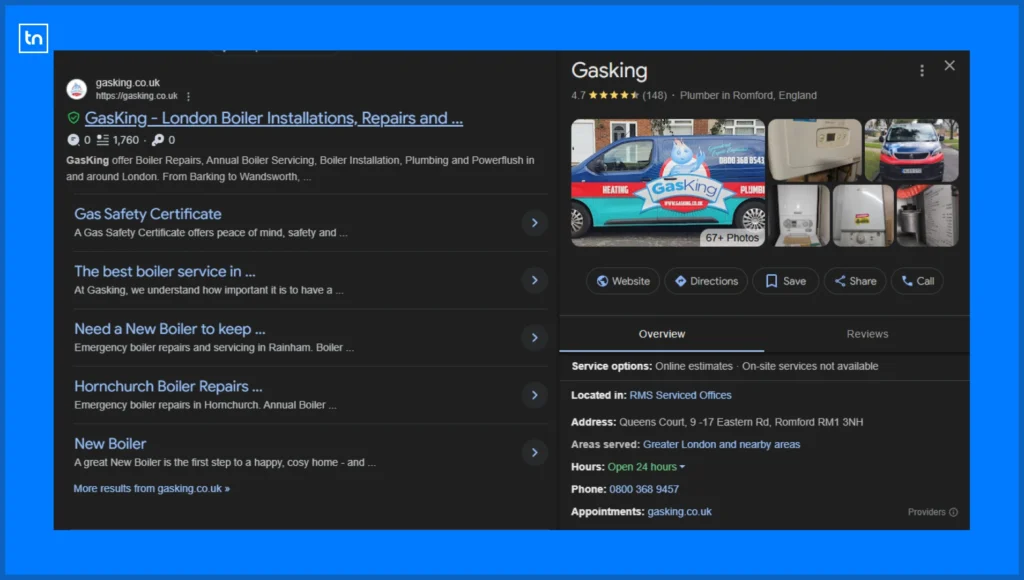
Want to learn more details about local SEO? Here you can find more information about what’s included in a successful local SEO campaign.
3 Methods To Get Backlinks As a Gas Engineer
Backlinks remain one of the most important aspects of ranking your website on Google as a Gas Engineer. Here are the 3 methods that worked for me:
- Collaborate with Builders and Plumbers: Partner with local builders, plumbers, and contractors to feature your business on their websites as a recommended gas engineer. Offer a reciprocal link back to their site or establish partnerships where they write testimonials about your services.
- Write Expert Blog Posts for Local Websites: Identify local community blogs or trade-related websites and offer to write guest posts. Focus on topics like “Top Tips for Boiler Maintenance” or “What to Do in a Gas Emergency.” You can include a link to your website in the author bio or within the content, just make sure the link fits naturally in the content and does not disrupt the information flow.
- Consistently Produce Expert Content: This is one of the most rewarding techniques known. When you write content that is strictly tight to the gas engineer’s industry, other website owners or SEO managers will find your content and link back to it, to prove the information on their blogs is legitimate and provided by a real expert.
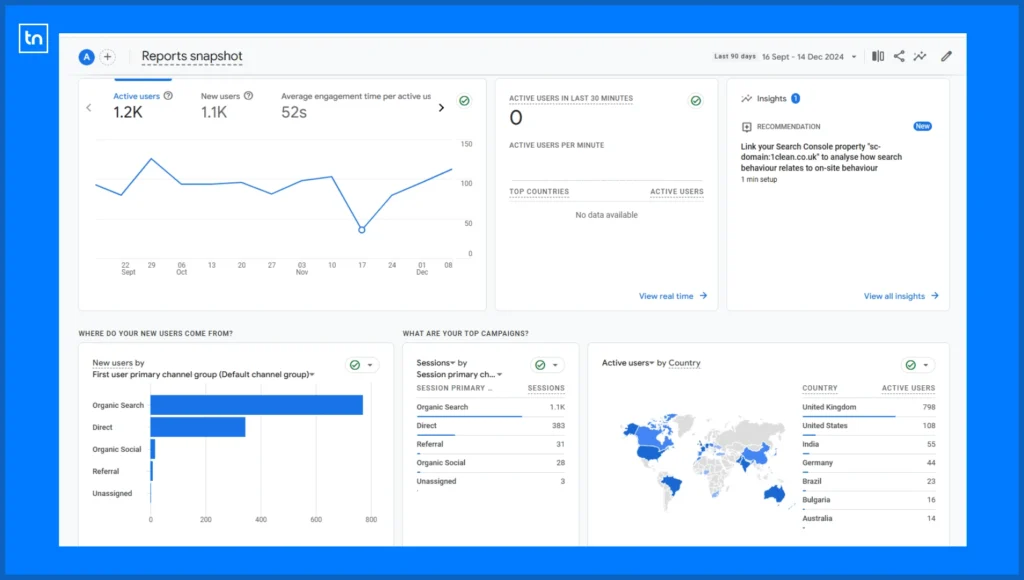
How to Track Your SEO Progress
SEO isn’t a one-and-done task – it’s an ongoing process. To ensure your efforts are paying off, you’ll need to monitor and refine your on-page SEO and off-page SEO strategies.
Essential SEO Tools To Use
- Google Analytics: Track how many visitors come to your site, where they’re from, and what pages they view.
- Google Search Console: Monitor your keyword rankings and fix technical errors.
- BrightLocal: A great tool for tracking local SEO performance.
How To Measure Success
- Rankings: Are you appearing for important terms like “boiler repairs near me”?
- Traffic: Is your website getting more visitors, especially from your local area?
- Conversions: Track how many enquiries or calls you’re getting via your website.
Common SEO Mistakes Gas Engineers Should Avoid
- Keyword Stuffing: Writing unnaturally just to cram in keywords can harm your rankings. Focus on clarity and readability. Now the Semantic SEO approach is important, meaning that your content has to be descriptive, in-depth and conversational.
- Neglecting Mobile Optimisation: If your site isn’t mobile-friendly, you’re losing leads.
- Ignoring Reviews: Negative reviews can hurt your reputation if left unanswered. Take time to address concerns professionally.
- Skipping Local Directories: Ensure your business is listed on directories like Yell, Checkatrade, and MyBuilder. Again these are only 3 directories, some of the best, however, you can list your business on 100s of other directories.
- Optimising GBP The Right Way: Not adding your services and service areas, or not adding questions and answers related to your business. Another common mistake is that gas engineers don’t use the “Updates” feature.
Take advantage of the “Updates” features to add current deals and discounts, and important information or publish your blogs and articles so people can find it easily on your profile. Here you can learn how to optimise a Google Business Profile,
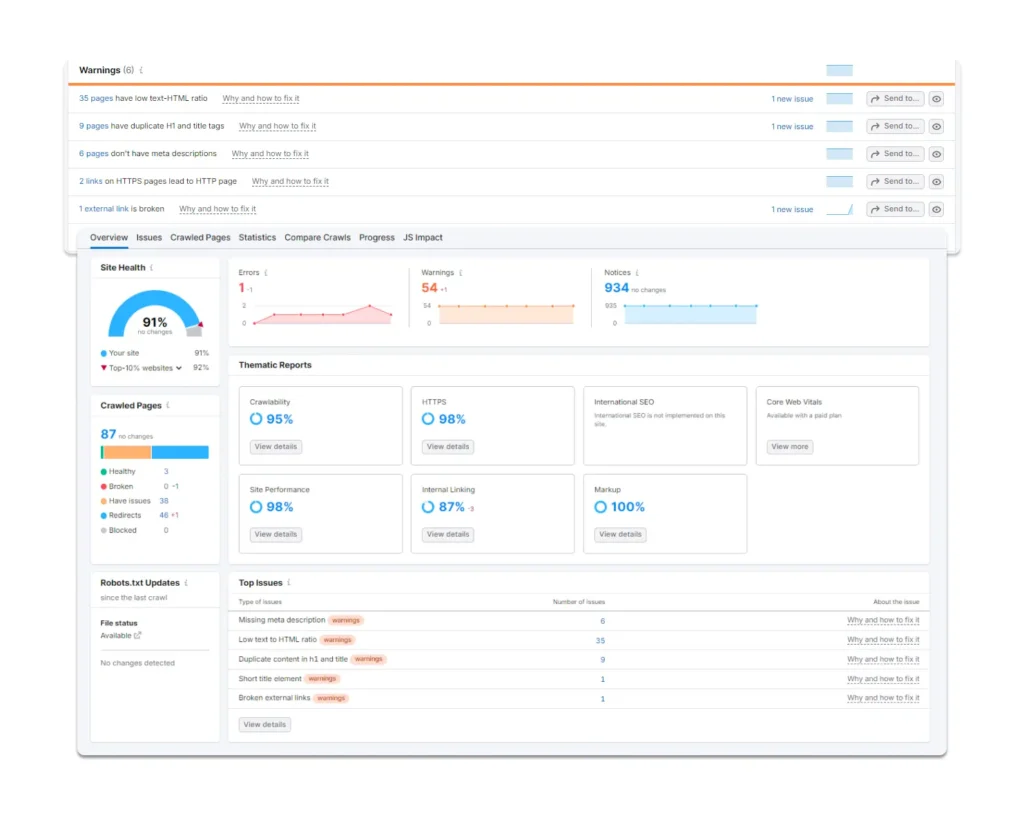
Do you want a free SEO audit for your website?
Conclusion
Learning about SEO for gas engineers is one of the smartest moves you can make for your business. With a well-optimised website, a strong local presence, and valuable content, you’ll attract more customers and build lasting trust.
Start by applying the DIY tips in this guide, and remember that consistency is key. Whether it’s updating your blog, engaging with customers online, or refining your Google Business Profile, every little effort brings you closer to success.
If you’ve been wondering how to make SEO work for you, the answer is simple: take the first step today. Here you can find the process that we follow for our clients so you can copy it and plan ahead to build your SEO one step at a time. The sooner you start, the sooner you’ll see the results!
SEO For Gas Engineers: FAQs
SEO for gas engineers involves optimising your online presence so local customers can find you easily when they search for services like boiler repairs or gas safety checks.
What’s the most important part of SEO for gas engineers?
Local SEO is critical. Optimise your Google My Business profile, encourage reviews, and ensure your website targets local keywords.
How long does SEO take to work?
SEO is a long-term game. You may see initial results in 3-6 months, but the best results come with consistent effort over time.
Can I do SEO myself?
Yes! With some basic knowledge and the right tools, you can implement SEO strategies without hiring an expensive agency. We’ve outlined the most important aspects in this DIY guide.










